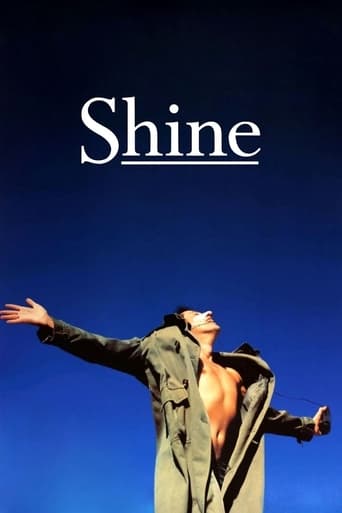

So much about this film is lush and entertaining. Hicks brings together an amazing cast for a touching story about a talented man tormented by a conflicted father and a disorder that is both debilitating and freeing at the same time. Beautifully photographed. Funny, touching and charming. The story is filled with great life lessons about understanding and tolerance. Triumph and tragedy. Captivating work.
... View MoreComing back to a fondly remembered film after many years can be revelatory - sometimes recalled greatness remains, or even appears enhanced; in other cases, it's more like a bottle of not very good red kept far too long. But Shine, the story of just about world famous pianist David Helfgott, to me is firmly in the first category. The story was just as compelling and engrossing as I recall from the promotional fund raising screening in 1996, all proceeds to The Melbourne Chorale.This was the role that launched Geoffrey Rush's film career internationally, and the film world is the richer for it. Mueller Stahl is totally believably awful as David's overbearing father, where his child prodigy's achievements are the totality of his world. Noah Taylor as the adolescent David and Alex Rafalowicz as the child prodigy are wonderful in these roles, and the visual continuity is convincing. This provides a logical lead in to Helfgott's mental health issues in his early adult life, where he is seen in various institutions in London and Australia.The editing, where Rush is seem playing parts of the scores he can manage, with cuts to other pianists is convincing, and as a medium level player, Rush's visible upper body looks like he is playing most, if not all, of those difficult notes.If you haven't seen it and are interested in the psychology of performers, in classical piano music, or just a well told tale, make the effort to dig Shine out. I don't think you will be disappointed.
... View MoreShort and Simple Review by WubsTheFadgerThe story is told masterfully and fluidly. The amount of stunning moments is astounding along with the powerful and heartfelt ending. The story is powerful and moving in a very inspired way. The "Fall or Break Down" sequence is astounding. Geoffrey Rush, Noah Taylor, and Armin Mueller Stahl all do outstanding jobs. Stahl portrays his character perfectly. Geoffrey Rush plays the part of a mentally broken down man in search for reassurance. Rush performs perfectly.The pacing in the beginning is a little slow but it is intended to build up the characters. The runtime is also a little bit long.Pros: Touching and powerful story, great ending, amazing acting, the break down sequence, and Geoffrey Rush's performanceCons: Some slow pacing and an overlong runtimeOverall Rating: 8.5
... View MoreFilms about classical composers ("The Music Lovers", "Immortal Beloved") frequently portray them as tormented, unstable geniuses, and the cinema often takes a similar view of those who interpret their music, whether as musicians ("Hilary and Jackie") or as ballet dancers ("Black Swan"). Like "Hilary and Jackie", which came out two years later, "Shine" is based on the life of a real classical musician, the Australian pianist David Helfgott. The film tells the story of Helfgott's life, especially his relationship with his father Peter, his struggles against mental illness and his eventual recovery.Peter is portrayed here by Armin Mueller-Stahl as a domineering tyrant who expects total obedience from his children and who is obsessed with winning and success at all costs. (To be fair I should point out that this portrait of Peter Helfgott has been challenged by some members of his family). Once David's musical talent is discovered, Peter becomes a hard taskmaster who takes over the boy's life, forcing him to practise day and night and to tackle the most technically complex and emotionally demanding pieces, notably Rachmaninoff's 3rd Piano Concerto.(It would appear that in the sixties the Rachmaninoff concertos were regarded as too daunting for students and only the most experienced pianists dared tackle them. Today, things appear to have changed. I recall that in the piano finals of a recent "Young Musician of the Year" contest in Britain five of six the finalists chose to play works by Rachmaninoff, with the sixth opting for Tchaikovsky; the commentators were left pondering why young pianists no longer want to play Mozart or Beethoven).Peter's methods have some success, because David becomes a prodigy who wins the state musical championship and is invited to study in America. Peter, however, forbids his son to leave Australia; when David accepts a subsequent invitation to study at the Royal College of Music in London his father disowns him. David's success, however, has come at too high a price, because while in London the emotional strain proves too much for him, and he suffers a mental breakdown and is committed to an institution.This was the film which first made a star of Geoffrey Rush, hitherto a little-known Australian actor. Indeed, it not only made him a star but also won him an Academy Award for Best Actor. Rush was not the first Australian actor to win the award- that was Peter Finch for "Network"- but he was the first to do so for a role in an Australian film. Rush was the fifth actor in nine years to win the award for playing a character suffering from either physical or mental disabilities; the others were Dustin Hoffman ("Rain Man"), Daniel-Day-Lewis ("My Left Foot"), Al Pacino ("Scent of a Woman") and Tom Hanks ("Forrest Gump"). (There were also a couple of "Best Actress" awards for similar roles around this time). This phenomenon was the subject at the time of some adverse comment to the effect that such awards were being given out on the basis of political correctness, but in fact a number of the performances in question were very fine ones, and Rush's is one of the best, up there with Hoffman's, Day-Lewis's and Marlee Matlin's in "Children of a Lesser God". Rush's verbal and physical mannerisms are highly suggestive of a man not completely in control mentally, yet this is a performance which goes beyond the purely physical. The David Helfgott who shines through beneath the surface peculiarities is a sensitive man, struggling against a mental burden too great for him to bear.Of the supporting performances, those that stand out are from Noah Taylor as the teenage David, Lynn Redgrave as his wife Gillian, who played a major part in his recovery, and from Mueller-Stahl as Peter, a tyrant yet one with his own mental suffering to bear. (The Helfgott family were Polish Jews who arrived in Australia as refugees from Nazism, and it is clear that Peter's character has been scarred by his terrible experiences in Europe). There is also a good cameo from the 92-year-old Sir John Gielgud as David's teacher in England.One criticism that has been made is that the film exaggerates Helfgott's status as a pianist. Although he eventually recovered from his mental illness and was able to start giving public recitals again, most musical experts do not regard him as being among the world's greatest talents. Yet such criticism strikes me as missing the point. The aim of the film is not to claim that Helfgott now ranks alongside the likes of Vladimir Ashkenazi or Yevgeny Kissin but to show how the love of his wife and his own willpower enabled him to overcome his mental illness and to play again for audiences. That, in my view, is an aim in which it brilliantly succeeds. 9/10
... View More